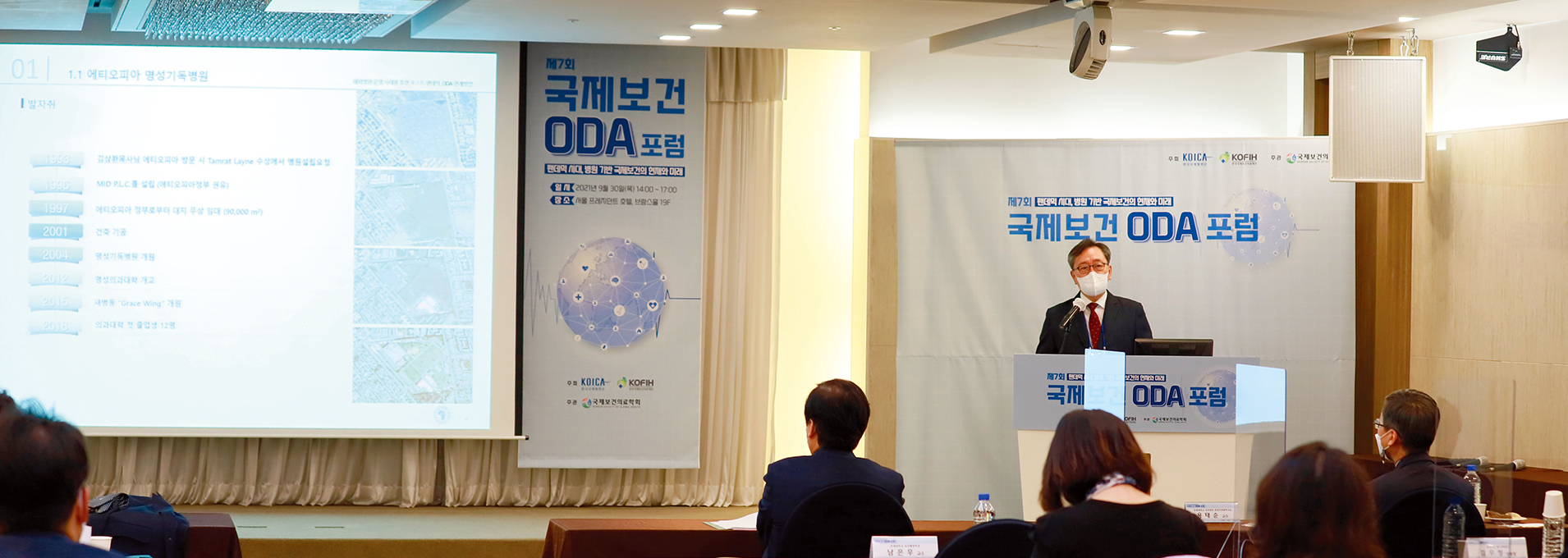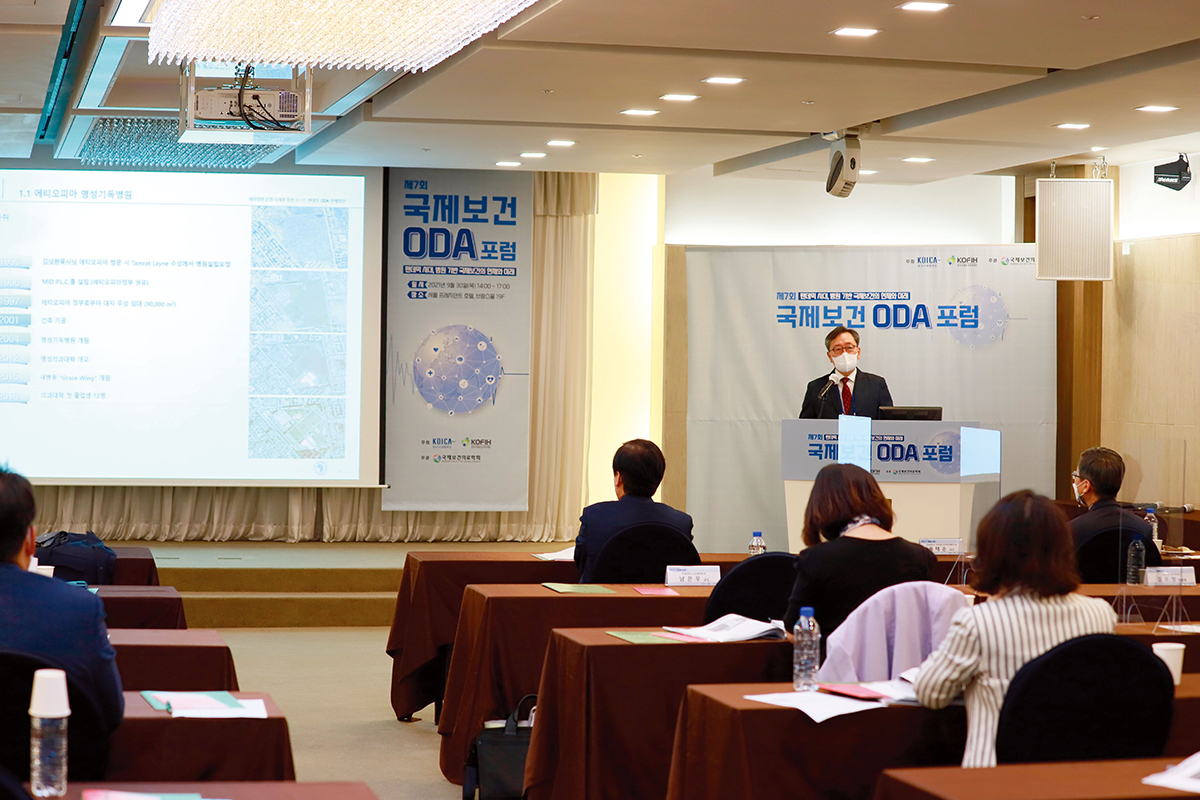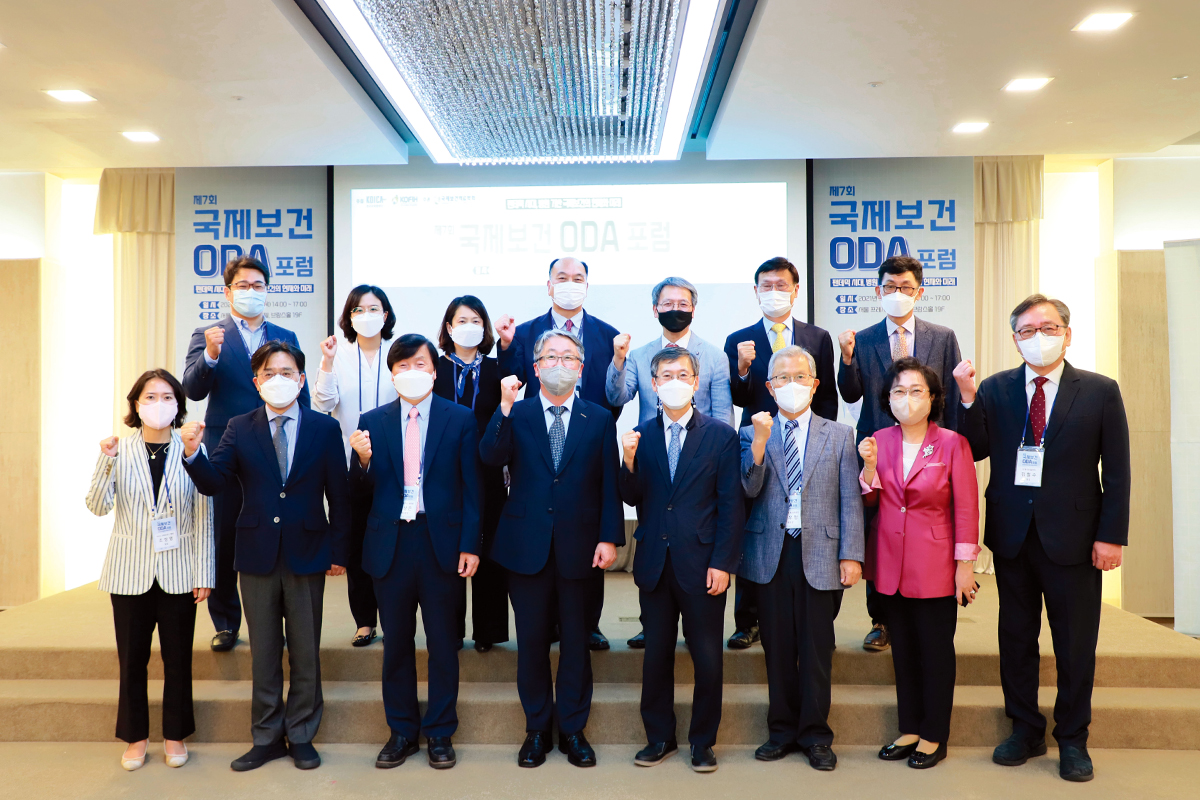본문영역

- INSIDE KOFIH
- KOFIH Inside Ⅰ
-
7th Global Health ODA Forum 2021
Presenting a new direction
for public healthcare
in the pandemic era- Written by_ CHO Yun
-
As the economic gap between developed and developing countries continues to grow, the prolonged COVID-19 pandemic is a bigger challenge for developing countries. In particular, the developing countries see no way out due to vaccine imbalances, with ten developed countries monopolizing 75% of all COVID-19 vaccines. A survey of 135 countries showed that the impact of communicable diseases on the national healthcare system is so enormous that more than 75% of medical services are paralyzed in about 9% of countries. This is why there is a growing demand for a new direction of official development assistance (ODA) for healthcare.
The 7th Global Health ODA Forum, held in September 2021, was a venue to discuss the solution to the issues.
 The 7th Global Health ODA Forum held on September 30, 2021
The 7th Global Health ODA Forum held on September 30, 2021
The 7th Global Health ODA Forum was held in Hotel President in Jung-gu, Seoul, on September 30, 2021. The theme of this year’s forum, which KOFIH has been holding jointly with the Korea International Cooperation Agency (KOICA) and the Korean Society of Global Health since 2017, was Pandemic Era, Present and Future of Hospital-Based Global Health. The forum was prepared to share outcomes of hospital ODA projects and discuss future directions.
While developing countries with underdeveloped medical services are facing a relatively difficult time due to the COVID-19 pandemic, the ODA projects are highlighted even in crises, as shown by hospitals supported by Korean ODA agencies are designated as anchor facilities for responding to communicable diseases. Moreover, the need for project organizations to explore new challenges in the new normal era is also growing.
Accordingly, this forum is significant in that the ODA project organizations and academic circles collaborated to highlight the role of hospitals, which are the core of healthcare, and seek future plans together. The event was held via YouTube streaming in response the COVID-19 pandemic. About 30 key officials, including former KOFIH Secretary-General Choi Won-il, director of KOICA’s Development Strategy and Partnership Song Min-hyeon, and president of the Korean Society of Global Health Park Sang-eun, attended the forum.
Emphasis on connection with overseas hospitals and communities
“Support from an investor's perspective, not just constructing a hospital”
The event organized for each subject featured five presenters. Kim Woo-jeong, director of Hebron Medical Center in Cambodia, gave a presentation on the “Experience of linking communities with hospitals and tasks in the new normal era,” and Professor Kim Chun-bae of Wonju Medical School of Yonsei University covered the “Achievements of development of local hospitals in Korea and lessons for ODA.”
Director Kim shared the experience of the Hebron Medical Center, established in Phnom Penh in 2007, of connecting with local communities, such as mobile treatment and response to chronic diseases and communicable diseases. He emphasized that the task of global healthcare in the pandemic era, when large-scale confirmed cases continued, was for “public hospitals and non-governmental organizations to integrate public functions continuously.”
Professor Kim talked about Korea's experience with receiving ODA aids by sharing the past cases of the World Health Organization and the US Agency for International Development carrying out regional health care system projects in rural areas in Korea. As Korea has now become an ODA donor country, he emphasized transparent and thorough ODA financial management and cooperation for the production of ODA research evidence such as academic treatise and expressed that it should be used as a lesson in ODA donation.
In the presentation that followed, Kim Soon-ae, head of the KOFIH Department of Strategy and Research, and Kim Cheol-soo, former director of Myungsung Christian Medical Center in Ethiopia, advised on the “Outcome of overseas hospital operation consulting projects” and “Post-pandemic ODA linkage plan through overseas hospital operation cases,” respectively.
Kim Soon-ae emphasized that it was necessary “for the grant and loan projects collaborate to construct hospitals centered on patients in developing countries rather than providers.” Her point was that while the grants and loans were mostly conducted separately, it was necessary to jointly plan the projects from the initial phase and implement sustainable programs.
Kim Cheol-soo expressed his opinion that "The future ODA projects should be approached from the perspective of investment for future market growth in developing countries, rather than just focusing on road and hospital constructions.” He mentioned that Ethiopia did not have a factory, so even basic medical consumables, such as gauze, were imported. Therefore, supporting business operations for local production could significantly contribute to national healthcare development.
Lastly, Cho Jeong-myeong, head of the KOICA SDGs Program Management Team, gave a presentation titled “Outcomes of hospital-based projects and the directivity in the post-pandemic era.” Cho identified the fact that KOICA-supported hospitals were playing the roles of a teaching hospital and a main hospital for treating high-risk patients within the region. He also added that the recently strengthened partnership between KOFIH and the Export-Import Bank of Korea’s Economic Development Cooperation Fund (EDCF) made it possible for the projects to respond flexibly to local situations as key achievements. As for future project strategies, discussions were held in regards to approaching from the viewpoints of (a) securing fairness through preferential support for the underprivileged, (b) internalizing cross-sectoral factors (human rights, gender, and environment), (c) establishing specialized hospitals such as children’s rehabilitation hospitals, and (d) going beyond pandemic crisis to disaster preparedness.
 Participants taking a group photo
Participants taking a group photo
Emphasis on professionalism in research and education beyond general treatment
KOICA to expand loan/grant linking projects
In the discussion session chaired by Professor Yong Tae-soon of Yonsei University College of Medicine following the presentations, Lim Hyeon Seok, director of Bethesda Medical Center in Uganda; Professor Lee Gyeong-su of Yeungnam University Medical School; Sohn Sung-il, head of the KOICA Department of Development Strategy and Portfolio Management, and; Shin Chi-beom, head of the KOFIH Department of Technical Cooperation Projects, exchanged opinions on health ODA strategies in their respective fields.
The participants agreed that the hospital projects in developing countries should expand patient care through a holistic approach beyond just treatment. Director Lim explained, “Myungsung Christian Medical Center and Hebron Medical Center, which are in well-operation in the local regions, should transfer the operation to the local staff and develop specialization through linkage with local healthcare.”
Professor Lee emphasized information sharing and consulting between ODA project execution organizations, local experts, and medical institutions to build hospitals tailored to the local community.
Sohn stated that a circulation system in which research and activities are shared between academic circles and project-performing organizations is essential. He also added, “It is important to secure sustainability by packaging the hospital ODA business on a large scale in the future,” focusing on self-reliance by expanding the period and scale of hospital projects. Shin emphasized the role of KOFIH’s newly established Department of Technical Cooperation Projects. KOFIH jointly plans projects for each field with EDCF and intends to conduct a joint feasibility study on the establishment of the Centers for Disease Control and Prevention in Cambodia. Shin said, “We expect new trials make the scope of the cooperation in future grants and loans become clearer and enable effective outcome management. We will consider the suggestions of the academic community and apply the necessary parts to the development of the hospital operation consulting projects in the future.” 

